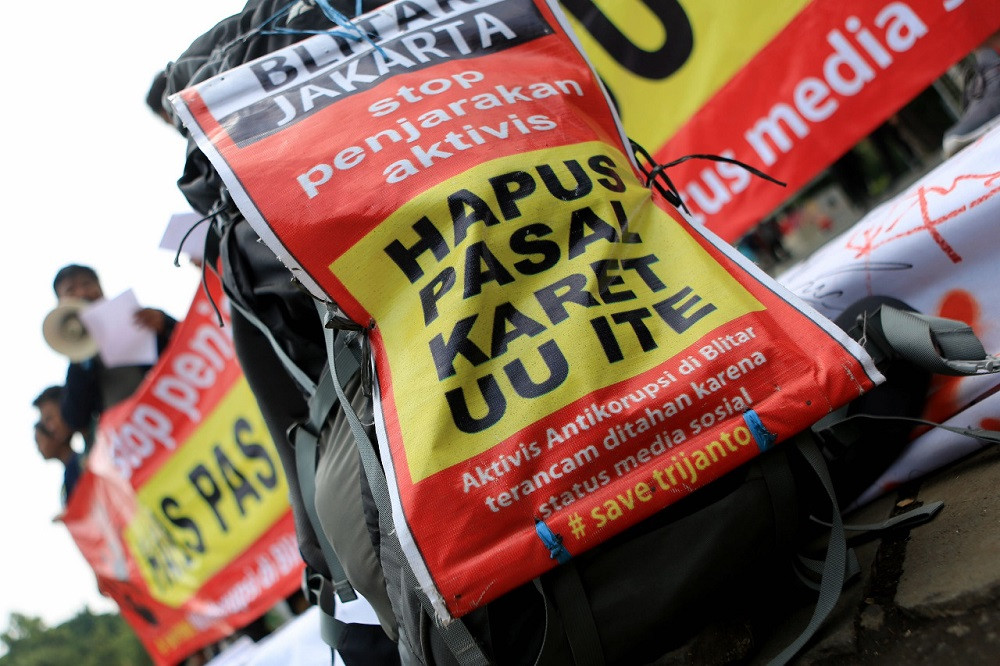Popular Reads
Top Results
Can't find what you're looking for?
View all search resultsPopular Reads
Top Results
Can't find what you're looking for?
View all search resultsIndonesia inches closer to ‘digital authoritarianism’
Cyberpolice ordered to act against COVID-19 hoax spreaders
Change text size
Gift Premium Articles
to Anyone
I
ndonesia moved closer to digital authoritarianism in 2020 as attacks against government critics and the criminalization of free expression reached new highs, two recent reports suggest.
The two reports, produced separately by the Southeast Asia Freedom of Expression Network (SAFEnet) and Amnesty International Indonesia but released at the same event on Wednesday, found that the COVID-19 pandemic had allowed authorities to constrict civic space in the country.
SAFEnet executive director Damar Juniarto said that throughout last year, law enforcement officers had taken "excessive measures" to limit the freedom of expression through the Electronic Information and Transactions (ITE) Law and by devising new regulations.
On April 4, 2020, for example, the National Police headquarters issued a circular instructing officers to patrol the internet and take action against anyone who spread hoaxes about the coronavirus or insulted the President or his administration.
The police issued a similar instruction in October 2020 following nationwide protests against the passage of the controversial Job Creation Law. Former National Police chief Idham Azis ordered authorities to carry out cyber patrols, to propagate negative sentiment about the jobs law strikes and to “create a counter-narrative against issues that discredit the government”.
Damar said both policies had led to an increase in infringements upon the freedom of speech, with the National Police investigating some 4,800 cases under the ITE Law last year, the most since 2017.
"Most of the cases investigated were related to defamation, insults to the President or his administration and the spreading of hoaxes or false news, the majority of which were reported to the police by public officials," he said.
Read also: After mulling over revising cyberlaw, the government has second thoughts
The Amnesty report, meanwhile, found that at least 157 people had been arrested for violations of the ITE Law last year, including 15 activists and four journalists. Fifty-seven were charged with spreading “false news” or insulting the President and his administration.
This was the highest number of annual cases in the past six years, Amnesty said.
Attacks also rose against activists, academics and students who discussed politically sensitive issues, such as alleged abuses in Papua, or criticized the government. From February 2019 to September 2020, Amnesty found, 201 human rights defenders and "social justice leaders" became victims of human rights abuses, either offline or online.
One of the victims was epidemiologist Pandu Riono from the University of Indonesia, who had been vocal about his doubts about the efficacy of the so-called COVID-19 “cure” developed by Airlangga University scientists, who worked in cooperation with the Indonesian Military (TNI) and the State Intelligence Agency (BIN).
Pandu's Twitter account was hacked late last year by an unidentified person who later published the epidemiologist’s private photos in an attempt to discredit him.
Two media outlets that have been critical of the government’s handling of the health crisis, tempo.co and tirto.id, also fell victim to cyberattacks last year.
Read also: Human rights deteriorated in Indonesia in 2020: Amnesty
The regression of free expression was even worse in the Papua region, SAFEnet found, with indications that the government had cut or throttled internet access in the region four separate times last year, even though such internet blackouts had been deemed illegal by the Jakarta State Administrative Court.
In June 2020, the court ruled in favor of SAFEnet and two other rights groups, declaring that the government had violated the law by instating an internet blackout in parts of Papua and West Papua in August 2019 as widespread protests escalated there. The protests were in response to incidents of racial abuse suffered by Papuan students in Surabaya, East Java.
Damar said cutting internet access during the COVID-19 pandemic could cause serious harm to Papuans because, despite the digital divide that persisted in the region, many residents were dependent on the internet for COVID-19 information and online education amid school closures.
“It violated not only their digital rights but also their rights to education and health – and even disrupted their economy,” he said.
Human rights may be eroded further this year
Ari Pramuditya of Amnesty’s Indonesia office said the free expression outlook for 2021 was grim, especially following the February establishment of a “virtual police squad” to track social media posts containing criminally offensive content.
Compounding the concerns, last week, newly appointed National Police Chief Gen. Listyo Sigit Prabowo issued a communiqué banning the publication of news related to "police violence and arrogance".
He quickly retracted the instruction and apologized following criticism from media organizations and rights groups, citing a "misinterpretation" and claiming that his actual intention was to advise police officers not to resort to violence and arrogance in front of the press or the public.
“Even though the instruction was retracted there were clear and systematic efforts from law enforcement authorities to limit the freedom of expression,” Ari said.
In February, President Joko "Jokowi" Widodo called for an amendment to the ITE Law. He said that the law was “the source” of the problems and its revision was “in particular to remove vague provisions".
But the plan failed to make it onto the House of Representatives’ 2021 priority list because the government said it needed more time to identify the problems with the law before deciding whether a revision was necessary.










